2025 RGME Autumn Colloquium on Fragments
June 27, 2025 in Announcements, Koller-Collins Center for English Studies, Manuscript Studies, Princeton Bibliophiles & Collectors, Rossell Hope Robbins Library at the University of Rochester, Visits to Collections
2025 RGME Autumn Colloquium
on Fragments
“Break-Up Books
and Make-Up Books:
Encountering and Reconstructing
the Legacy of Otto F. Ege
and Other Biblioclasts“
Friday to Sunday 21–23 November 2025
Hybrid and partly Online
Hybrid: In Person at Princeton and Online (Friday and Saturday)
Online: Zoom (Sunday)
*****
Colloquium Sponsors, Co-Sponsors, and Affiliates
Research Group on Manuscript Evidence
Princeton University Special Collections
The Friends of the Princeton University Library
Student Friends of the Princeton University Library
Princeton Bibliophiles & Collectors
Department of Art & Archaeology, Princeton University
Rossell Hope Robbins Library
and Koller-Collins Center for English Studies
at the University of Rochester
Bibliographical Society of America
Celia M. Chazelle
Barbara Hanselman
Barbara A. Shailor
[Your Name Here]
*****
[First posted on 5 January 2025, with updates. Now revised on 20 June 2025, 20 August 2025, 5 September 2025, and 29 October 2025, with changes in plan, co-sponsorship, host, and venues.]
Venue: In-Person, Hybrid, and Online
After an imposed change in venue from our initial plans, the Colloquium goes forward in online format, as planned from the beginning, with an in-person/hybrid component. Its dates remain the same, from Friday to Sunday 21–23 November. The changes allow us to turn to a new host, for which we give thanks. For the earlier version, see
Online sessions will take place on Friday to Sunday. Sessions and Workshops will be hybrid on Friday and Saturday, with venues in different locations at Princeton University and nearby.
On Friday afternoon, our Associate Eric White, Curator of Rare Books, will hold a special set of Workshops on Fragments at Princeton in Special Collections at Firestone Library of the Princeton University Library. These workshops and reports on original materials return to a tradition of the RGME with Symposia and other events at Princeton University, before the Covid Pandemic. For example:
- 2014 Seminar on Manuscripts and Their Photographs
- 2019 Anniversary Symposium Program
- 2020 Spring Symposium: Save the Date
For the 2025 Colloquium, searching for an appropriate location for other parts of the Colloquium beside the Workshops at Special Collections on the Friday afternoon, we explored collaboration with colleagues and organizations for other venues in Princeton to enable a Friday morning session and the Saturday sessions, all in hybrid format. Step by step, with assistance from the Friends of the Princeton University Library and the Department of Art & Archaeology, which had co-sponsored many of our Symposia before the Covid Pandemic. We give thanks for the generous responses to foster the plan for a ‘home’ for this Colloquium.
In such a way, people who travel to Princeton for the Friday workshops and related celebrations might also participate in other in-person sessions on both Friday and Saturday, leaving one session on Sunday to take place in online format only. With this news, some participants and attendees prepared to come to Princeton for the event IN PERSON.
With help of many kinds, we are able to report a collaborative event worthy of the initial plan to which many participants responded so enthusiastically (albeit for a different host which changed its mind). Reviving and transforming the plan has, we hope, been worthy of the complex, multi-faceted subject of fragments which reaches widely into very many aspects of manuscript and related studies, the history of collecting, and the recovery and transmission of written sources from the past. For this collaboration, we give thanks.
Plan
Motto:
“Yet will I leave a remnant,
that ye may have some that shall escape the sword among the nations,
when ye shall be scattered through the countries”
— Ezekiel 6:8

Private Collection, Leaf from ‘Ege MS 14’. Part of the Book of Jeremiah, Recto, Detail. Photograph by Mildred Budny.
By request, the RGME prepares a special 2025 Autumn Colloquium on the phenomena of widely dispersed remnants of dismembered manuscripts and other written materials scattered at the hands of biblioclasts such as Otto F. Ege (1888–1951), for a variety of purposes more and less laudable. We will showcase work being done in various centers and by many individuals on these materials, as part of long-term, laborious, significant, and sometimes dispersed research to identify, reclaim, and, insofar as possible, virtually reconstruct the originals and place them in context.
We seek to gather perspectives on the challenges and opportunities presented by the dispersed manuscript or other materials which survive, albeit disordered or reordered, after passing through the hands of collectors-turned-biblioclasts, for whatever reasons. Attention is given not only to manuscripts of many kinds but also to printed materials, ranging from incunabula to early-modern books and beyond — all grist for the mill in plundering and redeploying book materials from the distant past to recent past. Our quest is to recognize and, if possible, reconstitute their legacy in some ways.
Biblioclasts & Co.
A main focus, given the number and variety of projects dedicated to them, will be the manuscripts and other materials dispersed by Otto F. Ege and his collaborators, notably his wife/widow Louise and the New York book-dealer and book-breaker Philip C. Duschnes (1897–1970). Yet, not least because many of their remnants have joined or become intermixed with fragments dispersed by others and through diverse processes in varied collections, it is worthwhile to consider that complex factor for their effective study as well.
We will showcase the work of different projects dedicated to that study, compare notes about issues and methods of research, and set the legacy of those biblioclasts in the context of others working as predecessors, contemporaries, or followers, as they also redirected the course of manuscript and related studies by disrupting and dislocating its evidence. Fragments hold center stage. Their poignance as fragments of former ‘living’ wholes, both in their former codices and in the settings and landscapes of their own times, can resemble the patterns of dismemberment, fragility, dispersal, and partial or total disappearance which can beset many forms of existence.
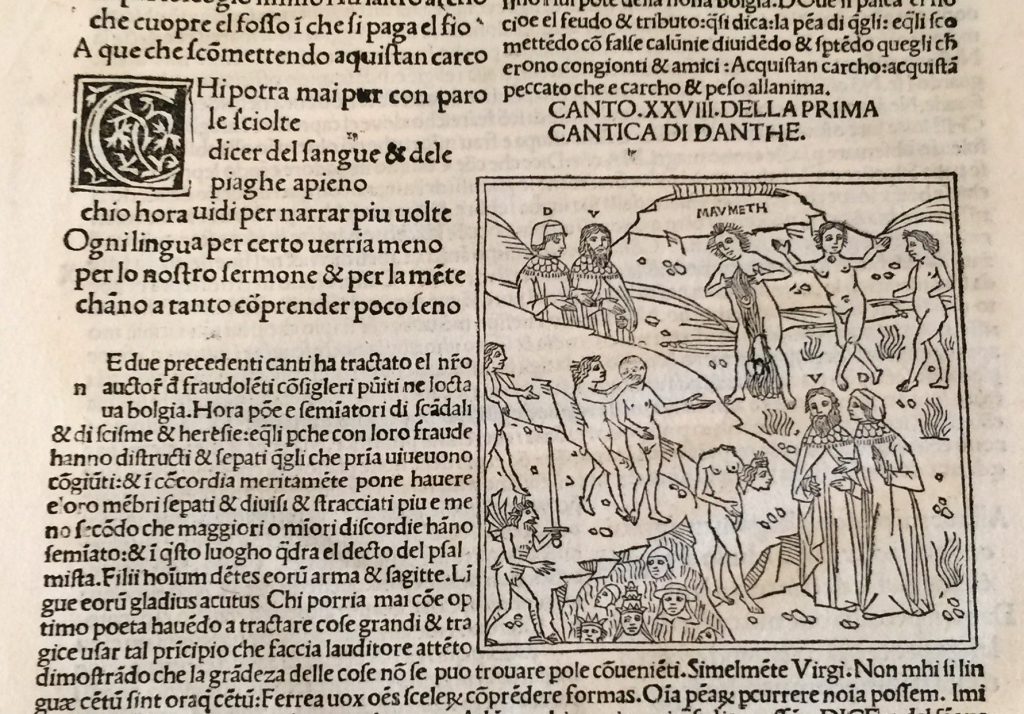
Private Collection, Ege’s FBNC Portfolio, Dante Leaf, Verso, Detail. Reproduced by Permission.
The ‘delivery methods’ of dispersal range from assemblages of sets of fragments as specimens in Portfolios, Leaf-Books, Albums, Scrapbooks, or Loose Leaves which might circulate in mats with or without labels, on their own, or in groups sans identifying information. In effect, many of these remnants were cast out on their own as no-name ‘orphans’ whom expertise, serendipity, and circumstance might recognize as ‘foundlings’ or find forever homes, whether virtual or actual. (See The “Foundling Hospital” for Manuscript Fragments.)
Our Colloquium highlights the processes of recovery by multiple, interlinked, and interlocking means, as we gather representatives from the fields of manuscript studies and fragmentology to share their stories, processes, progress, and accomplishments.

New Haven, Yale University, Beinecke Rare Book and Manuscript Library, Otto F. Ege Collection, Leaf in Ege’s Mat from ‘Ege MS 14’. Opening page of the Apocalypse / Revelations in a large-format Lectern Bible in the Latin Vulgate Version. Photograph by Mildred Budny.
Scope
The RGME organizes this international Colloquium with online and partly hybrid functionality, for access by a wide audience with interests in multiple subjects. Our organization, advisers, and participants combine experience and skills to produce a scholarly event with companion publications pre- and post-event, to promote and disseminate research work and discoveries in multiple, interrelated fields of study.
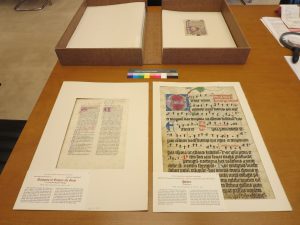
Beinecke Rare Book and Manuscript Library, Otto Ege Collection. The Ege Family FOL Portfolio opened for study, bringing forward Leaves 41 and 42 before the box. Photograph by Mildred Budny.
Our plan takes its starting point from the wish to gather expertise and perspectives from a different collections of manuscript materials and the rich variety of new and long-term projects (both institutional and individual) dedicated to research on the medieval Western manuscripts despoiled and dispersed by Otto F. Ege and his collaborators.
Further background appears here.
One such initiative is a new project by the Cantus database (Cantus: A Database for Latin Ecclesiastical Chant – Inventories of Chant Sources) to produce a database of the musical manuscript fragments in Ege’s Portfolio of Fifty Original Leaves from Western Manuscripts (FOL).
Ege’s renownd or notorious FOL Portfolio was issued in multiple sets now widely dispersed in public or private collections through North America and beyond. Like others of Ege’s Portfolios, some sets are lost, or lost track of. Some have themselves become fragmented, as parts have been removed, as specific manuscript specimens were further disjointed from their relatives, original or newer companions in the biblioclasts’ assemblages. Some of these ‘orphans’ or cast-offs have lost their identifying Ege mats or labels, further to complicate the issues of identification, recognition, and retrieval.
For years, the RGME and others, whether individual, collective, or institutional, have investigated aspects of that FOL Portfolio and others created by Ege, who deployed fragments of manuscript and printed materials presented as specimens for study and display. The RGME’s long-term project of research in these fields focuses on the variety of Ege’s Portfolios overall. Dedicated to specific genres of books, such as Famous Books or Famous Bibles, they include not only manuscript fragments but also a multitude of printed materials ranging from incunabula (up to the year 1500) to the twentieth century; all were selected and arranged by Ege and his circle as specimens of the graphic arts and book arts for instruction and display. (For examples, see our blog on Manuscript Studies and its Contents List for Ege materials.)

Private Collection, Leaf from ‘Ege MS 14’. Part of the Book of Jeremiah, Recto, Detail. Photograph by Mildred Budny.
Research on the surviving evidence on many fronts and in multiple centers can bring expertise to bear upon specific genres (such as manuscripts containing music). So, too, it reveals the processes of workshop practices over decades in the destruction, re-constitution, and further distribution of the original books. For example, such elements have bearing upon the provenance of individual fragments and potential impact upon that of other fragments whose provenance might not otherwise be known.

Collection of Richard Weber, Leaf from Otto Ege MS 14, recto. Photograph by Richard Weber.
Given the progress of these and other projects in various centers concerned with Ege’s legacy, the time is right to bring their representatives (established scholars, curators, collectors, and others, as well as younger scholars) together to compare notes, showcase their work, and strengthen contacts between individuals and centers across borders.
By examining the book-breaking practices overall by “Ege & Co.” in the wider context of biblioclasts over time, including many of Ege’s contemporaries, predecessors, and followers, we might gain fuller knowledge of the individually as well as collectively destructive habits and their legacy. Likewise by comparing notes, surveying the results so far of different projects, and, it might be, identifying more of the seemingly lost fragments in unknown or unexpected places, our Colloquium could cross thresholds and open more gateways to wider knowledge.
Such larger contexts provide wider horizons and more comprehensive awareness of the destructive tendencies towards books in given times and places. They can demonstrate, by examination and comparison, the particular characteristics or ‘style’ of the collector, book-breaker, book-seller, and the resulting forms as altered pieces or bodies of evidence for the lost and damaged originals. Among notable predecessors for the genre can be counted the albums of “visually appealing” manuscript fragments created by Samuel Pepys (1633–1703) or the cuttings prepared by John Ruskin (1819-1900) and others.

Cambridge, Magdalene College, Pepys Library, PL 2981, p. 4, no. 3, Psalter Psalm 38(37)20,, 21. Leaf No. 3 in ‘Calligraphical’ albums assembled by Samuel Pepys in 1700, with commentary by Humphrey Wanley. Image via https://fragmentarium.ms/overview/F-7w04; CC BY-NC-SA 4.0 License.
Examining the complex legacy of these various re-creators of medieval manuscripts and other written materials and the range of projects dedicated to them from perspectives and fields of many kinds, sometimes integrated across a broad spectrum encompassing expertise in the arts and sciences, can advance knowledge in individual projects as well as in wider discourse relating to the transmission of written evidence from generation to generation and century to century, with losses, discoveries, and re-constitutions along the way.
Our focus for the co-sponsored Autumn Colloquium is the legacy of book-breakers, book-destroyers, and book-re-creators active in multiple centers in Europe, the British Isles, and North America (at least), with the fragments produced by their activities and transmitted to diverse locations worldwide, often without appropriate identifying information. Our task, as receivers of the evidence from such disruptions, is to make sense of the evidence, identify it appropriately, recognize its characteristics as bodies of witnesses with a complex history, compare information about diverse projects (in many centers) relating to these materials, gather feedback, and disseminate the results to a wide audience.

Princeton, Princeton University Library, 138.71, recto: top. From the Feast for Saint Stephen Protomartyr. Leaf from Otto Ege MS 22, the ‘Warburg Missal’. Photograph by Mildred Budny. See manuscriptevidence.org/wpme/a-leaf-for-saint-stephen-protomartyr-at-princeton-from-otto-eges-warburg-missal/.
Purpose
This 2025 Colloquium stands within the long tradition of symposia, colloquia, workshops, and other scholarly events of the Research Group on Manuscript Evidence, now entering its second quarter-of-a-century as a nonprofit educational corporation based in Princeton, New Jersey. The RGME is dedicated to the study of manuscripts and other written records across the centuries. This year our theme is “Thresholds and Communities”.
The 2025 Autumn Colloquium will span three days from Friday to Sunday, 21–23 November. It will have a series of sessions with presentations and Q&A, roundtable discussions/panels, and hands-on workshops. The event begins on Friday morning with a hybrid session, runs for two days with hybrid sessions, and concludes on Sunday morning with an online session. Online access is through interactive Zoom Meetings hosted by the RGME.
To augment the scholarly sessions of presentations and discussions, we prepare for displays of original materials in manuscript and other forms. Led by Eric M. White, a pair of workshops on Friday afternoon (as two sittings) will examine selected “Fragments at Princeton”. On Saturday there might be an opportunity to examine some others’ original materials illustrating the theme of the colloquium.
The reception sponsored by the Friends of the Princeton University Library to end Friday’s sessions will lead from the scholarly program to further conversations. On both Friday and Saturday, after the days’ proceedings in person, an Optional Dinner, at attendees’ expense, would convene at a local restaurant to continue the conversation and nurturing of contacts.
For those people attending one or other sitting IN PERSON of Eric’s HYBRID workshops (Workshop 1 at 1:30–3:00 pm EST; Workshop 2 at 3:30–5:00 pm EST), we would encourage them — while waiting after Workshop 1 for the FPUL Reception to start, or after lunch for their Workshop 2 to start — to visit the current exhibition at Firestone Library of related interest, Form and Function: The Splendors of Global Book-Making
Details for registration for the Colloquium ONLINE (Friday to Sunday) or IN PERSON (Friday and Saturday0, for Workshops 1 or 2 (Friday afternoon) and for the Optional Dinner (Friday and/or Saturday at attendees’ expense) appear below.
Participants
Participants represent a wide range of interests, approaches, subjects, centers, and materials.
At the sessions (Friday morning, Saturday, and Sunday Morning), participants will present papers, report on work-in-progress, respond to Q&A, and engage in conversations with feedback. A round-table discussion on Saturday gives the opportunity to compare notes, pose questions, share in discussion, consider the challenges of biblioclasm and its retrieval, and view future prospects for the fields of fragmentology, Ege studies, manuscript studies, book history, and more.
The workshops (Friday afternoon) at Special Collections of Princeton University Library offer the opportunity for hands-on examination of selected original materials, both in manuscript and in print.
After the workshops, a reception hosted by the Friends of the Princeton University Library will celebrate the occasion.
Having set the venues into place, along with a reception, we continue to seek sponsorship for hospitality and logistics for other portions of the event.
Speakers, Respondents, Panelists, and Presiders
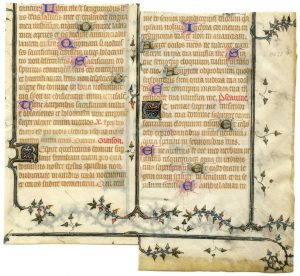
Rejoined Pieces of a Leaf from a Book of Hours. Private Collection. Photography by Mildred Budny.
Participants include (in alphabetical order):
- Alison Altstatt (University of Northern Iowa)
- Mildred Budny (Research Group on Manuscript Evidence)
- John P. Chalmers (Retired)
- Katharine C. Chandler (University of Arkansas)
- William Claspy (Kelvin Smith Library, Case Western Reserve University)
- Michael Allman Conrad (University of Saint Gallen)
- Lisa Fagin Davis (Medieval Academy of America)
- Juilee Decker (Rochester Institute of Technology)
- Augustine Dickinson (University of Hamburg)
- Scott Ellwood (Grolier Club Library)
- Steven Galbraith (Rochester Institute of Technology)
- Hannah Goeselt (Massachusetts Historical Society Library)
- Scott Gwara (University of South Carolina and King Alfred’s Notebook LLC)
- Elizabeth Hebbard (Indiana University Bloomington and Peripheral Manuscripts Project)
- Michael Hensley (University of Hamburg)
- Josephine Koster (Winthrop University)
- Debra Lacoste (University of Waterloo, Cantus Database, and Dalhousie University)
- David Porreca (Department of Classics, University of Waterloo)
- Eleanor Price (University of Rochester)
- Agnieszka Rec (Beinecke Rare Book & Manuscript Library)
- Jessica L. Savage (Index of Medieval Art, Princeton University)
- Irina Savinetskaya (Syracuse University)
- Barbara A. Shailor (Department of Classics, Yale University)
- Kate Steiner (Conrad Grebel University College and University of Waterloo)
- Anna Siebach–Larsen (University of Rochester)
- David W. Sorenson (Allen G. Berman, Numismastist)
- Richard Weber (Independent Scholar)
- Eric M. White (Scheide Library and Special Collections, Princeton University)
- N. Kıvılcım Yavuz (University of Leeds)
And others . . .
Program/Schedule
Having sorted out venues and times, we offer
1) Program Overview
2) Detailed Program
Both contain information for registration (also shown below)
Posters
The Posters for the event can be downloaded and circulated.
- Poster 1. Save-the-Dates: Friday to Sunday 21–23 November for 2025 RGME Autumn Colloquium
Download Poster 1

Poster 1. 2025 Autumn Colloquium: Save-the-Date. Poster set in RGME Bembino.
- Poster 2. Announcement: 2025 RGME Autumn Colloquium
Download Poster 2
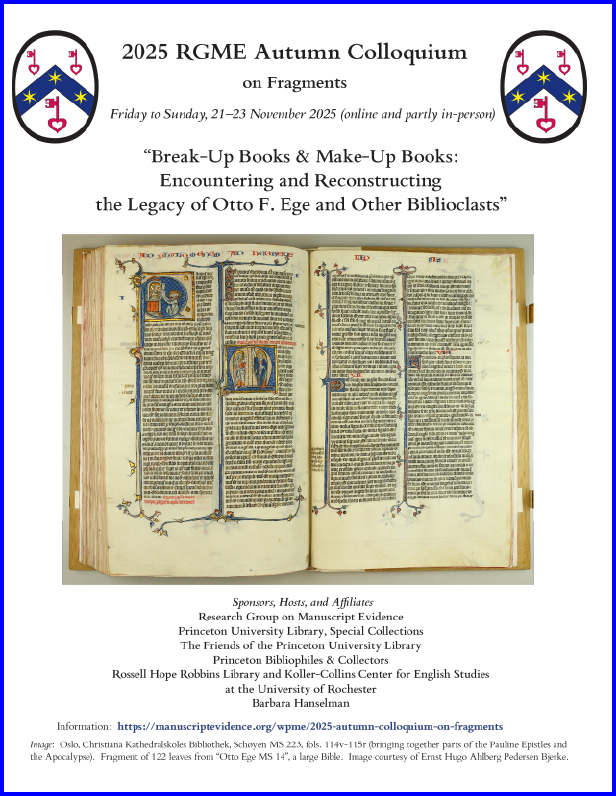
Poster 2. 2025 Autumn Colloquium. Poster set in RGME Bembino.
- Poster 3. Workshops on “Fragments in Princeton” (Friday afternoon, 21 November, 2 Workshops, in 2 sittings)
Download Poster 3
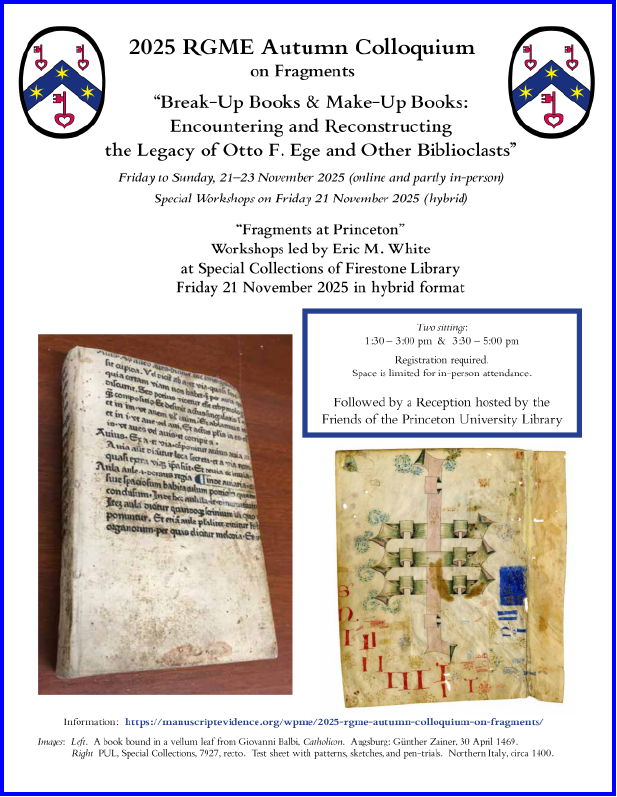
Poster 3 for 2025 Autumn Colloquium. Workshops on “Fragments at Princeton”
Some Results
RGME tradition produces illustrated Program Booklets for major events such as this Colloquium, with participants’ abstracts and selected accompanying illustrations, to grant insider glimpses for our audience (at the event and after) not necessarily familiar with the wide range of subjects and materials under discussion.
A recent example from our 2024 Autumn Symposium “At the Helm” can be downloaded from the RGME website:

Collection of Richard Weber, Leaf from Otto Ege MS 14, recto. Photograph by Richard Weber.
We explore sources of funding and sponsorship for the event as a whole. Information about the results would emerge as these explorations advance.
Our aim is to have an in-person event with online access (for speakers and audience) for a fully hybrid colloquium; the online functionality would occur by Zoom Meetings (rather than Webinars with closed access). If funding proves elusive for the in-person facets as well, the event will take place online by Zoom.
We hope to welcome you to the Colloquium.
*****
Note: For information about the RGME Autumn Colloquium as it develops, please continue to visit this ‘Home Page’.
For related RGME events, please see, for example:
2025 RGME Colloquium Booklet
The 64-page Colloquium Booklet, with abstracts and illustrations, will be available soon. When ready, it will be downloadable as a pdf in two formats:
- Colloquium Booklet as consecutive pages (quarto-size 8 1/2″ × 11″ sheets)
- Colloquium Booklet as foldable booklet (11″ × 17″ sheets)
Registration
To register for RGME events, please visit:
Everyone planning to attend should register.
To register for the Autumn Colloquium, we offer portals to attend ONLINE or IN PERSON respectively.
If you wish to attend a Workshop IN PERSON, please be sure to Register, whether attending other parts of the event or only a Workshop.
Registration
Everyone planning to attend should register.
Circumstances lead us to charge a modest registration fee to attend this 3-day event. The extra costs for preparations in several formats and from different locations require a registration fee to help to offset them. The registration fee is reduced for affiliated Students. The fee is waived for Speakers, Respondents, Panelists, Presiders, and Interns, for whose contributions we give thanks.
When you register, we ask you please to add the Eventbrite handling fee for the transaction, as a contribution to the RGME’s costs for this event.
We invite you to consider adding a Voluntary Donation to aid our nonprofit organization.
I. Colloquium Registration (for Workshop Registration see below)
Categories
1) General Attendance: $60 US per person
2) Student Discount for Affiliated Students: $35 US per person. When registering for the discount, please let us know your registered affiliation as a student.
3) Speakers, Panelists, Presiders, and Interns: Fee waived.
1) Register for ONLINE Attendance (Friday to Sunday)
2) Register for IN PERSON Attendance (Friday and Saturday)
II. Workshop Registration
For either Workshop, registration is required to attend IN PERSON. Space is limited. If spaces are filled in your category of attendance, you can register for a Waiting List.
The attendance fee for the Workshop is included within the Colloquium fee (“with Colloquium”). If you will attend other parts of the Colloquium, please register for the Colloquium (IN PERSON or HYBRID) before registering for a Workshop.
The Workshop Attendance fee pertains to participants who wish to attend a Workshop by itself, without other parts of the Colloquium (“not Colloquium“). To help to defray our expenses in organizing the event and its hybrid access, the attendance fee for a Workshop by itself is
1) General Admission: $17.00 US per person
2) Affiliated Student Discount: $7.50 US per person
When registering, please let us know your affiliation
3) Speakers, Presiders, Panelists, Interns: Fee Waived
1) General Attendance for one Workshop
1a) “not Colloquium”: $16 US per person
1b) “with Colloquium” (after registering for the Colloquium IN PERSON): included in Colloquium fee.
2) Student Discount for Affiliated Students for one Workshop
2a) “not Colloquium”: $7.50 US per person.
When registering for the discount, please let us know your registered affiliation as a student.
2b) “with Colloquium”: included in Colloquium fee
3) Speakers, Panelists, Presiders, and Interns: Fee waived.
To Register for a Workshop on “Fragments in Princeton” IN PERSON
Choose one of two Workshops (two sittings) for IN PERSON Attendance. Space is limited.
- Workshop 1. 1:30-3:00 pm
https://www.eventbrite.com/e/2025-rgme-autumn-colloquium- in-person-workshop-1-21- november-at-130pm-tickets- 1287472838919
— Check in at the Lobby entrance at 1:15 pm
- Workshop 2. 3:30-5:00 pm
https://www.eventbrite.com/e/rgme-autumn-colloquium-in- person-workshop-2-21-november- at-300-pm-tickets- 1774755835479
— Check in at the Lobby entrance at 3:15 pm
If space is filled, the Registration Portal allows you to sign up for a Waiting List.
If you have questions, please contact director@manuscriptevidence.org
III. Optional Dinner at Attendees’ Expense
(Friday and/or Saturday 21-22 November 2025)
- Choose one or both
Friday 21 November (about 7:00-9:30 pm)
and/or
Saturday 22 November (about 7:00-9:30 pm)
https://www.eventbrite.com/e/2025-rgme-colloquium-optional- dinner-friday-andor-saturday- tickets-1919146451699
Donations
We encourage you to consider adding a Voluntary Donation in support of the RGME, a Section 501(c)(3) nonprofit educational organization principally powered by volunteers. Your donations may be tax-deductible to the fullest extent permitted by law.
As our events have expanded (but not our infrastructure) and as grant opportunities have receded amid widespread pressures, we turn for help to you, our audience, friends, and community. Every contribution helps our small, but dedicated, organization.
See:
We thank you for your support and your interest in the Colloquium.
*****
Further Reading and Viewing
See the Handlist of Bibliographical References to accompany the Colloquium
Please add suggestions for this list!
*************
Questions? Suggestions?
- Leave your comments or questions below
- Contact Us
- Sign up for our Newsletter and information about our activities:
Send a note to director@manuscriptevidence.org or RGMEevents@gmail.com

Ege MS 61. Opening Lines (1-11) of the Book of Zachariah. Courtesy of Flora Lamson Hewlett Library, Graduate Theological Union, Berkeley, CA.
Visit our Social Media:
- our FaceBook Page
- our Facebook Group
- our Twitter Feed (@rgme_mss)
- our Bluesky nest @rgmesocial.bluesky.social)
- Our Instagram account (rgme94)
- our LinkedIn Group
Join the Friends of the RGME.
Register for our Events by the RGME Eventbrite Collection. Among them are the
- 2025 Spring and Autumn Symposia (online or hybrid)
- Episodes of “The Research Group Speaks” (online)
- RGME Workshops on “The Evidence of Manuscripts, Etc.” (online, in person, or hybrid)
- Meetings of the Friends of the RGME (online)
Please consider making a Donation in Funds or in Kind for our nonprofit educational corporation powered principally by volunteers. Your donations and contributions are welcome, and can go a long way. They may be tax-deductible to the fullest extent provided by the law.
We thank the sponsors, advisers, and participants for generously contributing to this Colloquium.
*****

‘New Leaves’ from Ege Manuscript 41 (Vellum), Verso, and from Ege Manuscript 51 (Paper), Recto, viewed in November 2016. Photograph by Mildred Budny
